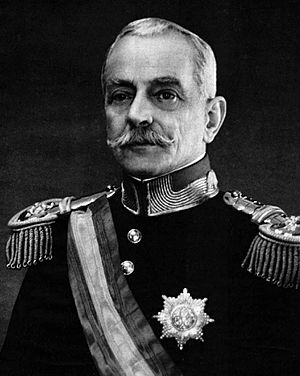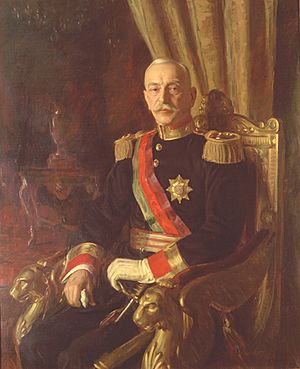Óscar Carmona facts for kids
Quick facts for kids
Óscar Carmona
|
|
|---|---|
 |
|
| President of Portugal | |
| In office 29 November 1926 – 18 April 1951 |
|
| Prime Minister | José Vicente de Freitas Artur Ivens Ferraz Domingos Oliveira António de Oliveira Salazar |
| Preceded by | Manuel Gomes da Costa |
| Succeeded by | Francisco Craveiro Lopes |
| Prime Minister of Portugal | |
| In office 9 July 1926 – 18 April 1928 |
|
| Deputy | Abílio Passos e Sousa |
| Preceded by | Manuel Gomes da Costa |
| Succeeded by | José Vicente de Freitas |
| Minister for Foreign Affairs | |
| In office Acting 4 September 1926 – 24 September 1926 |
|
| Preceded by | Bettencourt Rodrigues |
| Succeeded by | Bettencourt Rodrigues |
| In office 3 June 1926 – 6 July 1926 |
|
| Prime Minister | José Mendes Cabeçadas Manuel Gomes da Costa |
| Preceded by | Armando da Gama Ochoa |
| Succeeded by | Martinho Nobre de Melo |
| Minister of War | |
| In office 9 July 1926 – 16 November 1926 |
|
| Preceded by | Manuel Gomes da Costa |
| Succeeded by | Abílio Passos e Sousa |
| In office 15 November 1923 – 18 December 1923 |
|
| Prime Minister | António Ginestal Machado |
| Preceded by | António Maria da Silva |
| Succeeded by | António Ribeiro de Carvalho |
| Personal details | |
| Born |
António Óscar Fragoso Carmona
24 November 1869 Lisbon, Kingdom of Portugal |
| Died | 18 April 1951 (aged 81) Lisbon, Portuguese Republic |
| Political party | National Union (1932–1951) |
| Spouse | Maria do Carmo da Silva |
| Children | Cesaltina Amélia António Adérito Maria Inês |
| Alma mater | Portuguese Military Academy |
| Profession | Army officer |
| Awards | Order of Christ Order of Aviz Order of St. James of the Sword |
| Military service | |
| Allegiance | |
| Branch/service | |
| Years of service | 1889–1951 |
| Rank | Marshal |
| Commands | Portuguese Army 4th Division (1922–1925) |
António Óscar Fragoso Carmona (born November 24, 1869 – died April 18, 1951) was an important Portuguese Army officer and politician. He served as the 96th Prime Minister of Portugal from 1926 to 1928. Later, he became the 11th President of Portugal, holding this position from 1926 until his death in 1951. He also served as the Minister of War and twice as a Minister of Foreign Affairs in 1926.
Contents
Early Political Life
Óscar Carmona was a republican, meaning he supported a government where the head of state is not a king or queen. He quickly supported the creation of the Portuguese First Republic on October 5, 1910. However, he did not like the democratic style of government very much. He even said he only voted for the first time in 1933.
During the First Republic, he briefly worked as the Minister of War in 1923. Unlike some other famous military leaders, Carmona did not fight in World War I.
Becoming President of Portugal
Carmona played a very active role in the 28th May coup d'état in 1926. A coup d'état is when a group of people, usually military, suddenly takes control of the government. This event overthrew the First Republic.
After the coup, there were a few changes in leadership. Carmona was a leader of the more traditional and strong-minded part of the military. He believed the previous leaders were too weak. On July 9, 1926, he led another takeover with General João José Sinel de Cordes. Carmona then declared himself President and took on strong powers, acting like a dictator. He was officially elected President in 1928, being the only person running.
Working with António de Oliveira Salazar
In 1928, Carmona chose António de Oliveira Salazar to be the Minister of Finance. Carmona was very impressed by Salazar's skills. Because of this, Carmona made Salazar the Prime Minister in 1932. After this, Carmona mostly let Salazar manage the government.
In 1933, a new set of rules for the country, called the "Estado Novo" (New State), was created. This new system officially gave the President the strong powers Carmona had been using since 1928. However, in reality, Carmona became more of a symbolic leader. Salazar held the real power. The President could, on paper, fire Salazar, but Carmona usually let Salazar do what he wanted.
Carmona was re-elected without anyone running against him in 1935 and 1942. These terms lasted seven years each. In 1935, he signed a law that made Freemasonry illegal in Portugal. He did this even though he had been a Freemason himself.
Later Years and Death
After World War II, groups that wanted democracy were allowed to try and win elections. However, Carmona was not very friendly with them. When these groups asked for elections to be delayed so they could get ready, Carmona said no.
There were rumors that Carmona supported a military uprising in 1947 that tried to remove Salazar from power. It was said he would remain President if the uprising succeeded. To stop these rumors, Carmona finally accepted the title of Marshal, a very high military rank.
In 1949, Carmona, who was 79 years old, wanted to be President for a fourth time. For the first time, he had an opponent, General José Norton de Matos. But the government did not let Matos properly campaign. So, Matos left the race on February 12, giving Carmona another term.
Carmona died two years later, in 1951. He had been the President of Portugal for 24 years. He was buried in the Church of Santa Engrácia, a special place in Lisbon where important Portuguese people are laid to rest.
Personal Life
Óscar Carmona's father was a Portuguese Naval officer. In January 1914, Carmona married Maria do Carmo Ferreira da Silva. They had three children together.
He is the great-uncle of Carmona Rodrigues, who was the Mayor of Lisbon from 2004 to 2007. He was also a cousin of Brazilian President Augusto Tasso Fragoso.
Legacy
The town of Uíge in Angola used to be named Carmona after him. It kept that name until 1975, when Angola became independent from Portugal. His picture was also on an Angolan escudo banknote in 1972.
Images for kids
See also
 In Spanish: António Óscar de Fragoso Carmona para niños
In Spanish: António Óscar de Fragoso Carmona para niños
 | Roy Wilkins |
 | John Lewis |
 | Linda Carol Brown |


